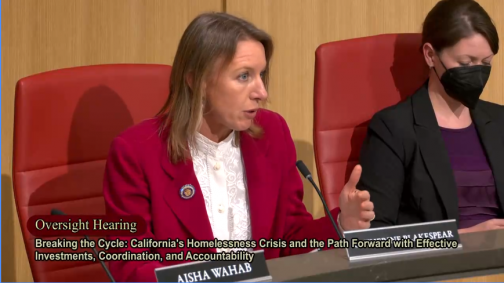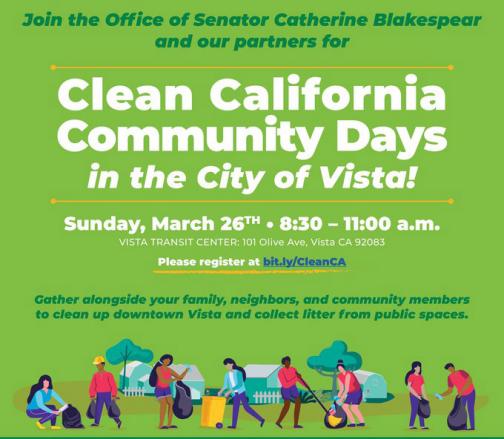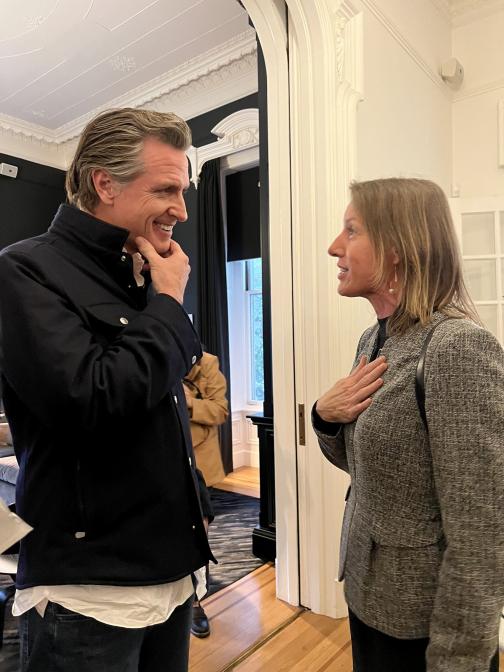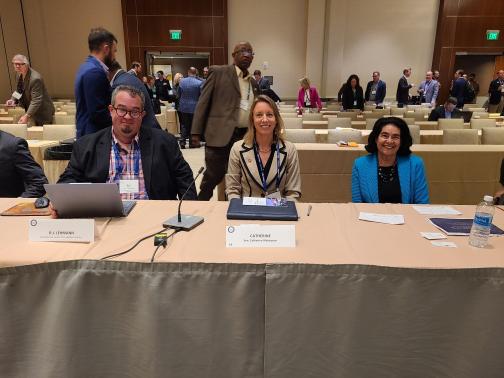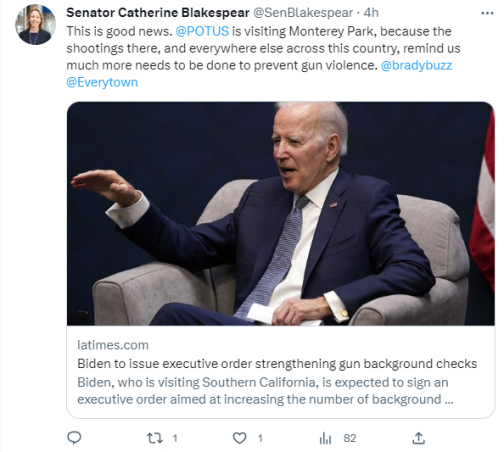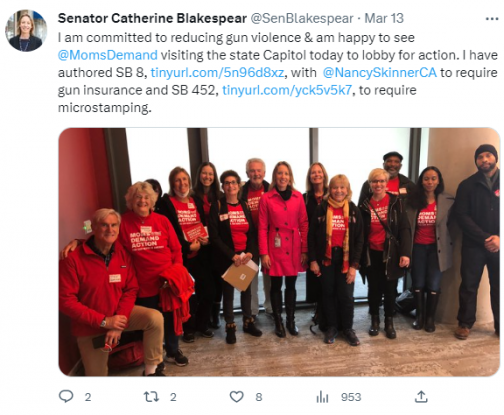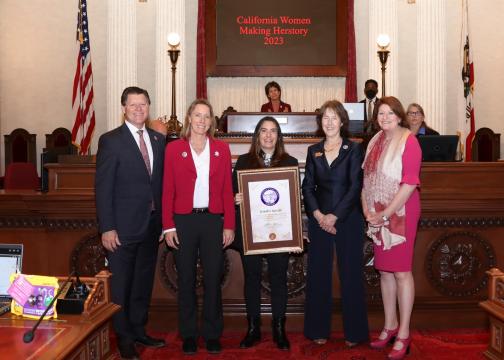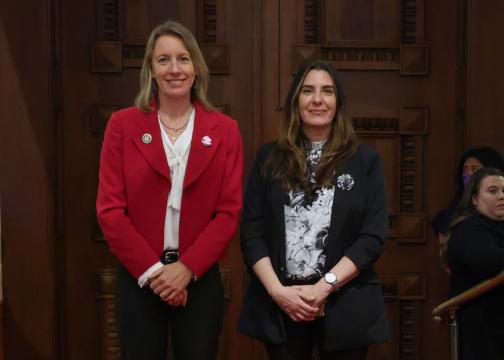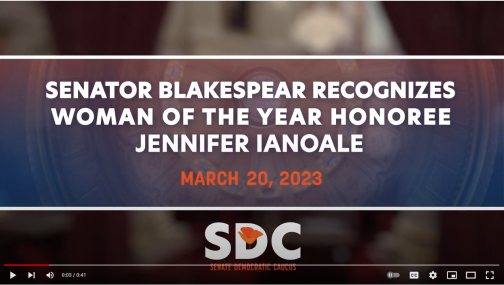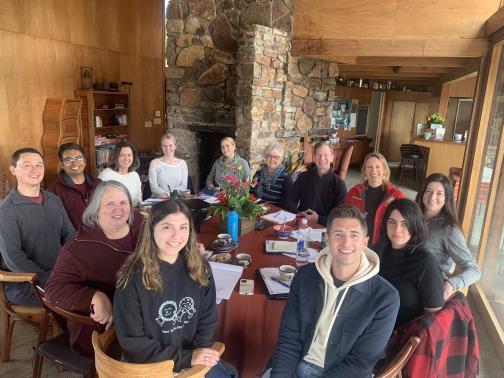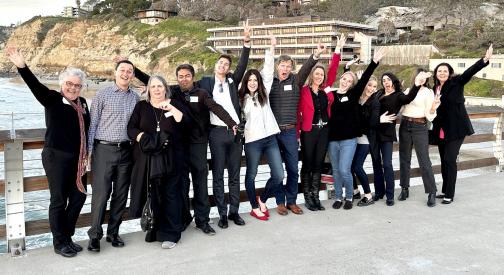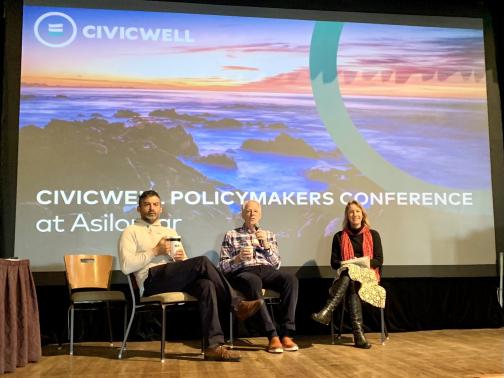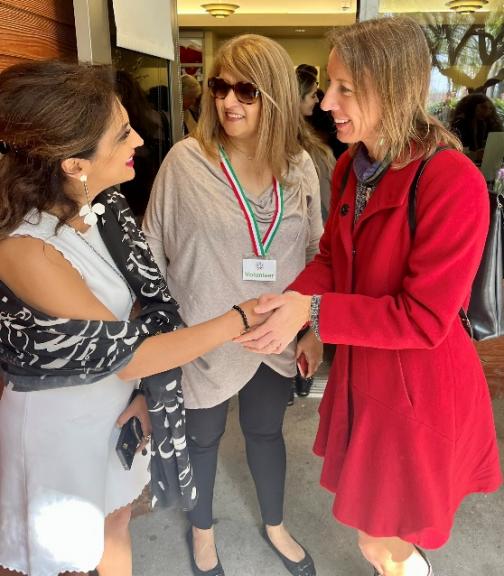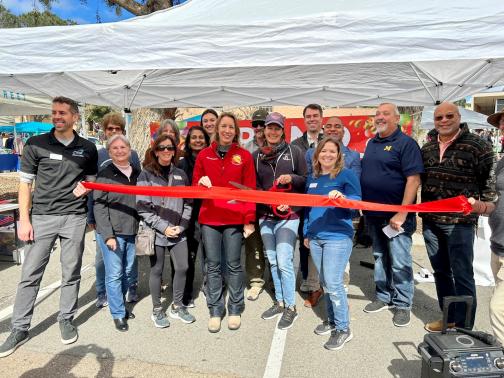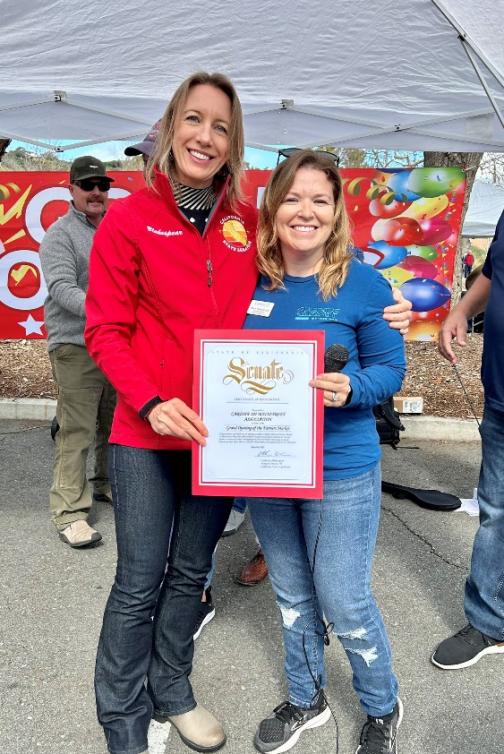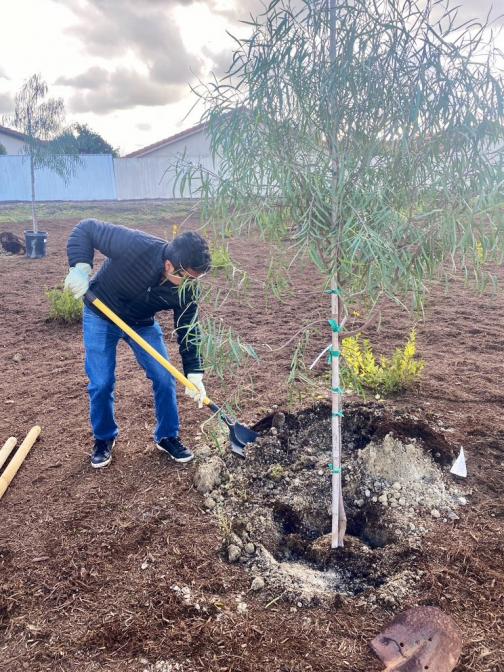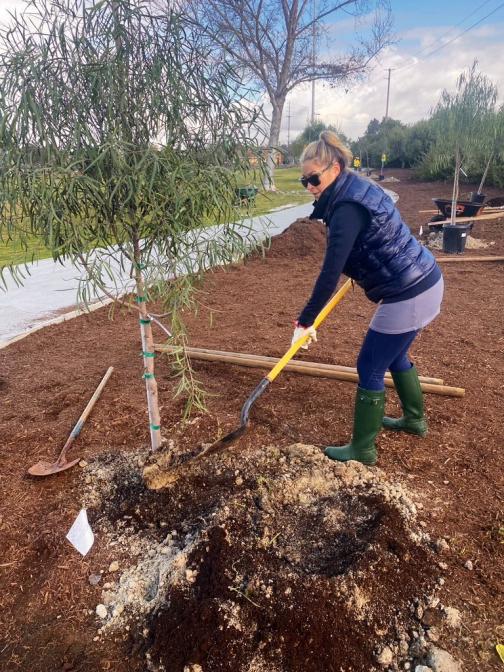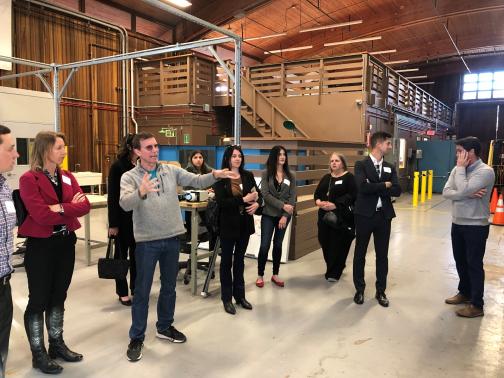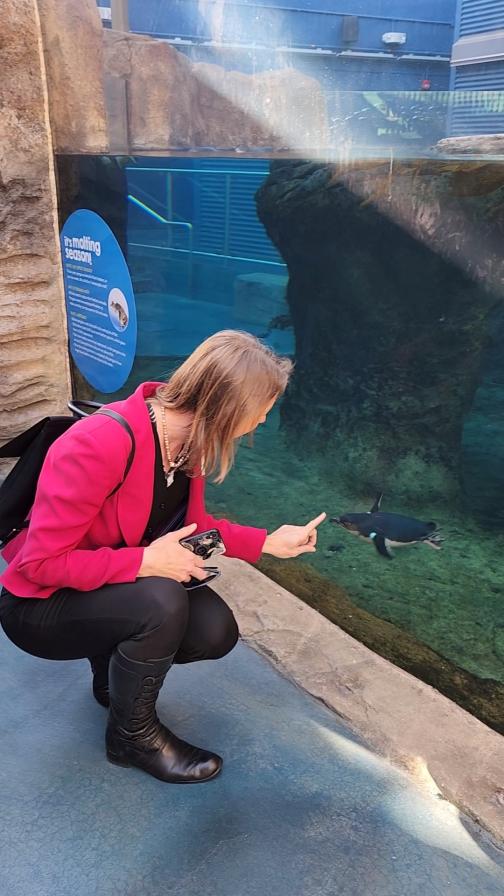News from Senator Blakespear
|
Dear friend,
This is an exciting time in the Legislature because the 2,600 bills authored by legislators this year will now be discussed and scrutinized in committee hearings.
Each house of the Legislature elects its leaders and the leaders assign legislators to committees focused on different policy areas. Those committees then meet to consider the bills in their subject areas.
March and April are busy months with lots of policy committee hearings as the myriad of bills introduced by legislators are considered. This is where the real work of legislating gets done! As committees identify questions or problems with bills, authors make changes by amending their bills so they can move them forward in hopes of being approved by both houses of the Legislature. Or, bills die in committee.
|
I was thrilled to be chosen to sit on the committees that I requested, namely housing, transportation and governance and finance. I also sit on the Joint Legislative Audit Committee, Joint Legislative on Climate Change Policies and the Joint Committee on Fairs and Allocations, and I received approval to form and chair the Transportation Subcommittee on LOSSAN Rail Corridor Resiliency.
I am very excited for the chance to be actively engaged at this committee level because it influences what happens for the whole State of California across a range of topics.
So far, I’ve been impressed with the bills introduced in the housing committee, one of which from Senator Scott Wiener would allow religious institutions and institutions of higher education to more easily build affordable housing on the land they own. It’s estimated that there are 38,000 acres of potential land in existing communities where new housing that is adjacent to existing housing could be built. Providing a clearer regulatory path to construct badly needed 100% affordable housing is a really good idea.
None of my bills have been through any committee hearings yet. I’ll let you know what happens when they do!
I know there is a lot in this newsletter – I have been very busy! I am passionate about serving you, and that starts with transparency. I will always do my best to let you know what I am working on.
I am honored to be your state senator and am so energized to work on your behalf!
Thank you for putting your trust in me.
| In partnership, |
 |
| Senator Blakespear, 38th District |
|
Join us and RSVP here: http://bit.ly/CleanCA
|
In my former role of Chair of the SANDAG Board of Directors while Mayor of Encinitas, I spearheaded the county wide “Litter Abatement Subcommittee,” which worked with Caltrans to reduce litter on our highways. As a public representative, I feel pride in our public spaces, just as private property owners feel pride in their private spaces and work to keep them clean.
Keeping tidy and well-maintained streets, transit centers, freeways and beaches is an important value that we communally should share and collectively need to elevate. The community cleanup we’ve planned in Vista this weekend helps promote this value. Join us at 8:30 a.m. on Sunday, March 26 at the Vista Transit Center, 101 Olive Ave., as we gather to remove litter from downtown Vista.
It’s looking like we’ll have great weather on Sunday! Wear comfortable clothes and please sign up if you plan to attend. (Go to http://bit.ly/CleanCA to register.) Volunteers will receive trash grabbing sticks and bags to pick up and collect litter. The cleanup ends at 11 a.m.
|
|
Last week, I spoke with Gov. Gavin Newsom and I chose to focus on an issue that is of utmost importance to my constituents and the entire state, which is homelessness and the need for policies and resources that directly solve for this growing disaster. I am grateful that the Governor is focused on the problem and working hard to address it. He recently announced a new state bond to be placed on the November 2024 ballot that would, if passed, raise between $3 billion and $5 billion to house and treat thousands of people with mental health disorders.
It is my contention that a major impediment to solving the crisis of unsheltered people living on the streets is that no level of government – city, county, state – in California feels responsible for preventing and ending homelessness and every level thinks a different level should do more and do it better. We all need to own the problem and I think the state can do more. Cities have land use authority; counties oversee mental health and substance abuse programs; and the state writes policies and distributes money. It takes all of us leaning in to solve this issue.
Last week, every senator in the Caucus was invited to offer written feedback on the Governor’s proposed budget and the below is an edited excerpt of my letter.
The State Needs to Make a Greater State Investment in Specifically Homeless-Serving, Low-Cost Housing
In the last five years, since 2018, the state has invested $23 billion into homelessness and housing programs, according to the LAO report Recent Homelessness-Related Augmentations and Oversight. Yet, despite this record investment, the Point in Time Count, which is acknowledged as an undercount of the true number, shows a 6.2% increase in homelessness since 2020 and a 23% increase since 2007.
Encampments are getting larger, with more public spaces inaccessible for the public, more human suffering, more environmental degradation in our cherished riverbeds, canyons and forests, and a diminishment of our California experience. Homelessness is objectively growing worse every month.
It’s staggering and deeply troubling to know that California is home to HALF of the unhoused people in the entire country, according to the Public Policy Institute of California.
Treatment for people suffering with mental health and drug addiction is critical AND having housing that is affordable is critical. California does not have a higher proportion of people diagnosed with mental illness or substance abuse disorders than other states. But we do have less affordable housing.
It’s clear that we need more affordable housing and we need to require that people live in that housing.
We Need Greater State Investment in Programs That Directly Build Housing For People To Live In Once They Exit The Shelter System or When they Become Housing Insecure
Using our existing approach, we simply have no data or trend lines that show we are going to reduce – let alone eliminate – homelessness, despite reforms, investments, and some bright spots around housing production. I urge a focused infusion of state resources into the programs that build and buy homes to house people when they leave the shelter system or when they are about to become homeless.
One of the most clear bottlenecks along the existing continuum is the lack of nearly-free housing for someone exiting the shelter system who wants to live inside and stabilize their life instead of returning to an encampment. This reality creates the revolving door of staying in a shelter, hospital, jail, family reunification and tent encampment only to return to street homelessness. While the most effective housing at reducing repeat homelessness is permanent supportive housing, according to the data, not everyone needs ongoing or permanent support.
With nearly half of the homeless population of senior age, the reality is that many people are simply not able to create an income that will allow them to afford housing in the private market. The state should invest in programs that require cities, counties, continuums of care, or MPOs to construct actual housing units so people are actually housed.
According to an LAO report, as of September 2022, navigation centers and emergency shelters were the largest eligible use of HHAPP funds with $405 million expended to date. We need greater investment in creating the homes that people will live in AFTER they use navigation and stay in the shelter.
We need to create and invest in a specific program at the city, county, regional, or state level where the public sector builds low-cost housing at scale.
A bill introduced by Sen. Anna Caballero (SB225) would fund a program to acquire and rehabilitate naturally occurring (i.e. unsubsidized) affordable housing units and attach long-term affordability restrictions. This seems like an intriguing start to get more housing units available more quickly.
|
|
I had the pleasure of giving a presentation to the National Council of Insurance Legislators Spring Meeting held in San Diego earlier this month.
They invited me to speak on the panel entitled “Liability Insurance for Gun Owners: Is it Time?” because I have introduced a bill, SB 8, which would require gun owners to have liability insurance. Here is some of what I told them.
Did you know that in 2021 firearms overtook cars as the leading cause of death for children age 19 and under?
Modern society is awash in insurance products because our complicated, fast-moving world is full of risk. So, as I started thinking about the immense cost of our nation’s gun violence problem – besides being horrified by reading about the consequences of shootings of all types – I started to think about insurance.
If insurance companies had to compensate victims for accidental gun injuries, insurance companies would want to reduce their exposure. In other contexts, insurance requirements affect decision making, for example, the homeowner who puts a fence around the pool, opts against a vicious dog breed, or removes a trampoline.
Liability insurance would drive a focus on safer storage of firearms, which in turn could lead to a reduction in tragedies such as school shootings. Nearly 75% of school shootings are carried out by a gun that came from the home. We could reduce school shootings by improving safe storage in the home.
The premise of my legislation is that gun owners, rather than members of the public or victims of gun violence, should bear the costs of gun violence delivered by their guns.
The cost of gun violence is stupendous. According to a report by Everytown Research and Policy issued last summer, gun violence has a $557 billion economic cost to the country each year, the equivalent of 2.6 percent of the U.S. Gross Domestic Product.
Every year, 117,345 people are shot – 40,620 die from gun violence, and 76,725 survive gunshot injuries.
|
And who pays for that? Primarily the public does.
According to the Everytown report, each gun death costs US taxpayers an average of $273,904 for the initial and long-term repercussions of that incident and each nonfatal gun injury costs $25,150.
I know gun legislation is always controversial because people are passionate about guns and their right to own them - I understand that.
So, let me be clear, with this legislation I am not talking about taking away guns.
Rather, my view is guns are part of society the same way cars are. So let’s make them as safe as possible and incentivize responsible choices, like safe gun storage.
|
What we have learned in modern life is that when insurance is required for something, the motivation to save money and prevent expensive payouts drives safety improvements.
The auto industry is a prime example. Vehicle deaths declined nationally 15 percent from 2007 to 2015 and that is attributed to safety improvements in vehicles prodded by carmakers seeking to avoid liability lawsuits and consumers wanting lower cost auto insurance.
This is not the end-all-be-all for addressing gun violence. But it is one simple step that makes sense.
To learn about my other bills, read my March 6 newsletter.
|
|
I was delighted this month to recognize Jennifer Ianoale of Vista as the Senate District 38 Woman of the Year.
Ianoale, who is director of Unicorn Homes in Oceanside and serves on the Vista Public Arts Commission, has worked for many years to support the LGBTQ community and has devoted endless hours to community activism and public service.
Jennifer’s commitment to serving her community is admirable and inspiring. She has been a tremendous resource to the North San Diego County LGBTQ community, providing support and education to all who need it, and housing and counseling to at risk youth.
In celebration of Women's History Month, each year members of the state Legislature recognize a woman from the district they represent for their outstanding accomplishments and service to their communities.
|
Unicorn Homes is located at Oceanside's North County LGBTQ Resource Center and provides housing and resources to youth who face mental, physical, and emotional trauma. While providing a safe place to live, Unicorn Homes aims to reunite families whenever possible and helps youth reach their goals by providing mental health resources, job training and independent living skills.
In addition to her work at Unicorn Homes, Jennifer has been a community leader for decades, working as an activist and on many pro-equity political campaigns, educating others about LGBTQ issues and engaging with and supporting at risk youth. She is also currently a member of the MiraCosta College LGBTQ Advisory Board and vice president of the Democratic Club of Vista.
Watch her being honored on the Senate floor.
|
|
Every day, my staff is working to help constituents.
For example, a resident of Oceanside contacted our district office to share the challenges her family was experiencing in pursuit of a Home Modification Grant through the California Department of Housing and Community Development (HCD).
The resident had submitted the necessary documentation for the grant and intended to modify her home to provide accommodations for her quadriplegic daughter. After an initial denial and months of no response, my office went to work and began communicating with HCD in hopes of advancing her application and securing the funds that her family deserved.
The constituent recently updated our office to share the exciting news that they have been approved for the maximum amount of $5,000! HCD has given her permission to begin construction, and her family is in the process of widening doorways and installing a more effective wash basin in their home. I am proud of the work that my staff did to make this happen.
If you have a state government issue we can help with, please contact one of my district offices. Call my Encinitas office at (760) 642-0809 or my Laguna Hills office at (949) 598-5850.
|
|
In my last newsletter, I talked about the work I have done to hire staff and build a strong team to serve you. I was excited to bring all my staff together recently for a day in my district.
This was the first chance for many of them to meet each other in person because they work in different offices that are far apart, and for the staff from Sacramento, it was their first time to see the communities I represent. My 12 staff are split between my Capitol office in Sacramento and my district offices in Laguna Hills and Encinitas.
We all felt uplifted and empowered by this wonderful day of goal-setting and team-building. Public service is a higher calling and I am so impressed by the dedication of my staff, who are positive, energetic and devoted to serving you!
A big thank you to our facilitator, Janette Williams, who helped lead us through productive and enlightening team-building discussions. Serving as your state senator is a true honor and I am thankful to have a talented team committed to helping me.
|
|
I still have one key position left to fill, my Legislative Director position in Sacramento. Here is what the position entails and how you can apply.
The Legislative Director is in charge of effectively navigating the legislative process to ensure the successful passage of my legislation. The Legislative Director oversees the legislative team, provides effective and strategic direction to staff, tracks and monitors critical deadlines, and provides vote recommendations.
The Legislative Director is also in charge of developing fact sheets, drafting committee and floor statements, and other duties as assigned. The ability to multitask, navigate complicated policy, and express sound political judgment is required.
A strong team ethos, a commitment to justice and equity, and a desire to mentor and uplift the next generation of legislation and policy leaders while working in a fast-paced office in Sacramento is essential. A successful candidate will have demonstrated experience working on legislation.
Monthly salary range is $7,400 - $14,084. Seniority and experience is required to reach the higher end of the salary range. To apply, please submit your resume, cover letter, and Senate application to my Chief of Staff, Heather.Resetarits@sen.ca.gov with the title “Legislative Director.”
|
CivicWell Policymakers Conference
|
I participated in a panel discussion with Santa Barbara County Supervisor Das Williams (left) and CivicWell Policy Director Roger Dickinson (center) at the CivicWell Policymakers Conference last week.
The topic was “Effectively Influencing State Climate Policy from the Local Level.”
That’s certainly a topic I know a lot about. As Mayor of Encinitas for six years, I worked hard to turn climate change goals into deliverable actions.
Every community must take the threat of climate change seriously, and act at the local level.
Nowruz Market
|
It was wonderful to attend the Nowruz Market in Mission Viejo put on by the Orange County Iranian American Chamber of Commerce. Nowruz marks the first day of spring and the beginning of a new year. Nowruz is celebrated by more than 300 million people all around the world and has been celebrated for over 3,000 years in the Balkans, the Black Sea Basin, the Caucasus, Central Asia, the Middle East and other regions. I was glad to have the opportunity to introduce myself to the thousands attending and enjoy the festivities.
Cardiff Farmers Market
|
I was so glad to be on hand for the grand opening and to present the Cardiff 101 Mainstreet Association with an official Certificate of Recognition from the State of California (below) for the Cardiff Farmer’s Market.
|
Planting Trees in Oceanside
|
My staff joined residents of Oceanside for its Arbor Day Celebration. They helped plant trees at Mance Buchanan Park. This is the type of community activity that helps us all, because trees play an important role in efforts to combat climate change. They remove carbon dioxide from the air and release oxygen into the atmosphere. In addition, trees provide shade during extreme heat, block winds and prevent soil erosion. Thank you Oceanside Public Works Department for organizing this event!
|
Visiting the Scripps Institution of Oceanography
|
One of the great treasures of San Diego is the Scripps Institution of Oceanography at UC San Diego. Scripps has been a revered center for ocean and earth science research more than 100 years!
In today’s world of climate change, the work being done by Scripps is more important than ever. According to Scripps, its scientists “work to understand and protect the planet, and investigate our oceans, Earth, and atmosphere to find solutions to our greatest environmental challenges.”
My staff and I visited the Birch Aquarium, Coastal Data Information Program Lab, Scripps Ocean-Atmosphere Research Simulator and Ellen Brown Scripps Memorial Pier. We learned about the Southern California Coastal Ocean Observing System and Scripps coastal flood forecasting and erosion research. It’s all very impressive.
Thank you Scripps for all you do, and thank you for hosting us!
|
|
To learn more about what I am doing, follow me on social media.
|
|
Email my office at Senator.Blakespear@Senate.ca.gov
Call my Encinitas district office at (760) 642-0809
Call my Laguna Hills district office at (949) 598-5850
Call my Capitol office in Sacramento at (916) 651-4038
###
